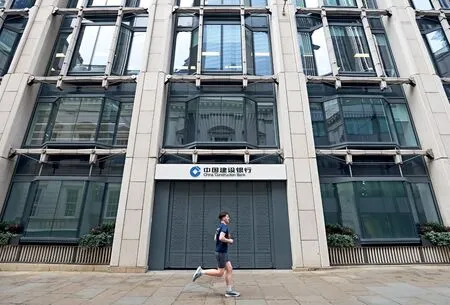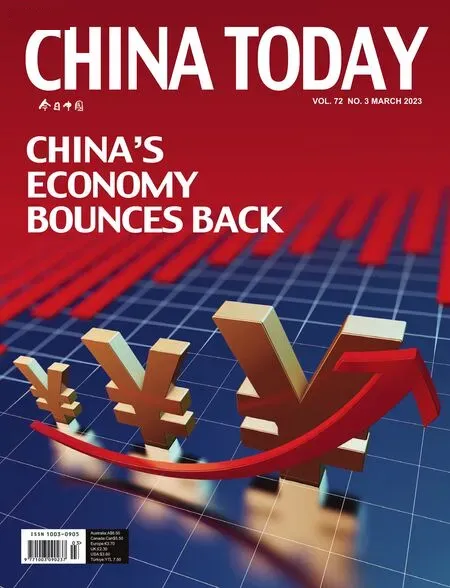Back on Track
By SUDESHNA SARKAR
The founder of a financial consultancy weighs in on the impact of China’s re-opening and other hot issues.
EMMANUEL Daniel’s connection with China is undeniably strong and long,stretching all the way to Antarctica.When he decided to usher in the new year by traveling below the Antarctic circle– where the mean winter temperature varies between -20 and -40 degrees Celsius – the 100-odd passengers on the cruise ship included eight Chinese and he was able to practice his Chinese even on the seventh continent.
When he’s not traveling around the world –he’s covered 110 countries over the last 25 years– he’s a financial services wiz based in Beijing, a blue-ocean entrepreneur and a debutant author.A Malaysian-Singaporean, he founded a publication calledThe Asian Bankerin 1996, which has since grown into a research and consulting company for the banking and financial services industry.
With China ending its quarantine requirements for international visitors, Daniel sees “an incredible demand” for traveling to China among two kinds of people.One group comprises people who already have “historical relationships” with China and want to return to engage with “people on the ground.” The other consists of people who have a new interest in China.

A jogger runs past the offices of the China Construction Bank Corp.in the City of London, the U.K., on January 18, 2022.This is the sole RMB clearing bank in the U.K.
It is understandable, given the growth forecasts for the Chinese economy in 2023.According to the World Bank, China's economy will grow the fastest among all major economies.Its Global Economic Prospects report projects that the Chinese GDP will grow 4.3 percent, compared to 0.5 percent in the United States and flat growth in the eurozone.The ASEAN+3 Macroeconomic Research Office (AMRO) in Singapore estimates 4.3 percent growth for the ASEAN+3 region, buoyed by an anticipated rebound in the Chinese economy with containment measures scrapped and the economy reopening.“With recession risks still haunting the United States and Europe, China’s economic reopening cannot come at a better time for the region.China’s stronger economy will provide support for regional activity while the border reopening will boost intraregional tourism,” AMRO’s chief economist Hoe Ee Khor said.
The Asian Bankerhas a ringside view of the developments in the region, thanks to its Beijing office, just as it had in the past.Started in Singapore,The Asian Bankeropened a second office in Shanghai in 2000.Then in 2001, Daniel had an impactful encounter that gave a new direction to his company.He met Jiang Jianqing, then president of ICBC, the world’s largest bank by assets.“He told me, come to Beijing, it’s a good time to come to Beijing.He [also] told me that although he was himself from Shanghai, if I was serious about being successful in banking in China,it’s better to move to Beijing to be closer to the banking regulators.”
Heeding the advice, Daniel movedThe Asian Bankerto Beijing and was rewarded with a“frontside view” of China’s dramatic economic progress since it joined the World Trade Organization in December 2001.It also gave him an “onground feel” of how the Chinese banking system was reacting to the changes taking place.

The expansion project of Hainan Yangpu Regional International Container Port kicks off at Yangpu International Container Terminal on January 11, 2023.The port will meet the world's largest container ship berthing needs and better serve the construction of Hainan Free Trade Port and the new western landsea corridor.
There is a marked contrast in the work of the company then and now.“In the early years, the Chinese banks used to ask us to bring experts from other countries to teach them about the strategies and infrastructure they could implement in China.But today, the Chinese banks have reached a level of sophistication that is unparalleled around the world.So, we conduct study tours for foreign bankers to learn and understand China.…Today, we educate the Western world that the developments taking place in China are real and worthy of emulation in the West.”
SUPPORT
“China’s stronger economy will provide support for regional activity while the border reopening will boost intraregional tourism.”
Daniel returned to Beijing from Antarctica five days after the quarantine requirement for international visitors had been scrapped on January 8 and the atmosphere was relaxed and easy.He just had to do a COVID-19 test in Singapore 24 hours before the flight to Beijing.
In the post-pandemic era, he sees the world trade scenario transforming.“The global trade ecosystem that China is re-entering today is very different from the one before the pandemic.Before the pandemic, China dominated world trade and was the lowest cost manufacturer of almost all goods and services.During the pandemic, many countries reiterated the importance of having their own manufacturing capacity of some kind.Also, global manufacturers started diversifying their manufacturing and logistics sourcing to not be overly dependent on any one country.So, we are now entering a much more fractured manufacturing and sourcing supply chain, for which China has to fight to retain its dominance,” he said.
He feels “maybe the time has come for Chinese companies to invest in decentralized manufacturing and sourcing facilities in different parts of the world and tie them back to a China-centric supply chain.This new ecosystem is still in its infancy and how Chinese investors play these global shifting trends must be watched carefully.”
The Asian Bankersees a very busy time ahead.“Our foreign clients are interested to know the strength and quality of the balance sheets of China’s leading banks that have foreign counterparties.They are also interested to know if they can participate in China’s financial technology(fintech) industry.As for our Chinese clients,including several fintechs, they are looking for opportunities to build their business in Southeast Asia and Europe.”
In June,The Asian Bankerwill organize a China pavilion at the Fintech Week London, followed by one more in New York in October.It is also organizing study tours where foreign investors and bankers will meet innovators and their companies in China.
With the Ukraine crisis turning one year old on February 23, what is the impact on global banking and finance, especially vis-a-vis China?Daniel thinks it has demonstrated the limitations of the global banking and finance infrastructure and hastened the emergence of alternatives,such as the Chineserenminbias an international currency.
“Both Russia and Ukraine are global suppliers of wheat and precious metals required for a range of consumer and high-end digital technologies.The desire of the United States to dictate the global financial system has been met with several alternative alliances in payments and capital markets.China has offered the RMB as an alternative payments platform to the dollar.The state of play currently will result in a very different global financial order that will provide alternatives to the U.S.-dominated version we are familiar with.These have nothing to do with the morality of the crisis itself; it simply has to do with how different countries respond to the economic crisis created by the conflict.The longer the conflict tarries, the more it will give time for the alternatives in the global financial system to settle into working systems in the future.”
"The longer the conflict tarries, the more it will give time for the alternatives in the global financial system to settle into working systems in the future.”
Besides, the U.S.itself has changed the rules of engagement by raising interest rates and making the dollar more expensive worldwide.This has also triggered the trend in looking for alternative sources of capital.“So, it is not just the Russian-Ukraine crisis but several factors working in tandem to alter the face of finance.One of the positive effects of the conflict hopefully will be absorbing the excess cheap capital that has been swirling around the world, but this again will be dependent on central banks not printing good money after bad.”
Daniel has also seen a positive effect of the pandemic during his travels around the world.“Many governments had become increasingly better organized, even in less developing countries in Africa.I was impressed with the COVID-19 tracking and controls in places in countries like Uganda, Rwanda, and even very poor countries like Burundi.I do believe that the pandemic taught many governments that they are able to provide better infrastructure to their people and I am curious to see how governments themselves will develop relative to the private sector in building better infrastructure in these countries in other areas of their economies.”He also credits “the small but highly developed countries like Singapore and the UAE” with leading the way to opening up and living with the virus because their economies depend on being accessible to the rest of the world.

Though the world seems to be finally emerging from the shadow of the pandemic, he has a caveat.There could be a new global economic crisis based on increasingly intangible digital assets.The 2008 U.S.banking crisis was triggered by derivatives of derivatives, not tangible assets like mortgages or the price of gold.And he sees this trend set to continue as the economy becomes increasingly digitized.“This also means that the GDP of a highly financialized economy will be much larger than the GDP of economies with real-world applications like manufacturing and agriculture.The GDP of a highly debted country can also appear larger than those that are not if their debts are traded as assets in the global financial markets.How these highly financialized economies will be managed and how they behave in the global economy will give cause for many potential conflicts for which there are no existing models for resolution.”
There’s another trend Daniel predicts.In 2022,he debuted as an author with his book,The Great Transition: The Personalization of Finance is Here, which predicts that finance will become increasingly “personalized” and the individual will have increasingly more control over how they transact and with whom.“This will put considerable pressure on traditional banks and financial institutions to remain relevant in a changing world,” he points out in his book.
The book also outlines the developments in China’s banking industry, especially over the past 15 years, the role of the fintech players in the country and how these fit into the development of the industry worldwide.“All countries will continue to be influenced by new developments in technology, and Chinese regulators have to take into account where the trend will take them.”

